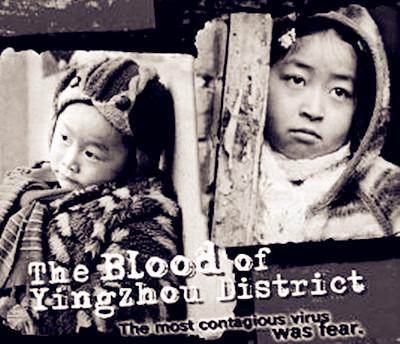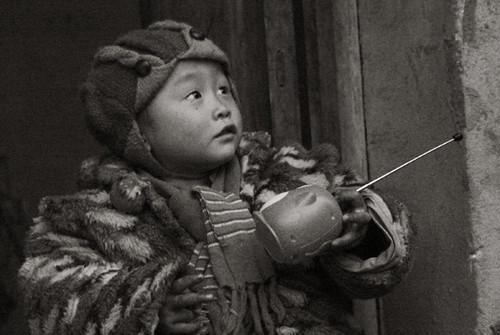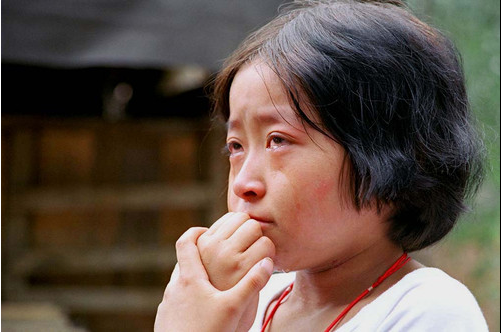The film "Blood of Yingzhou District" about HIV-positive children infected through mother-child transmission and directed by Ruby Yang won the 2007 Academy Award for Documentary Short.
It documents the life of two orphans living with AIDS in Yingzhou District, Fuyang, Anhui of eastern China.
Nan Nan, 13, lived with her 16-year-old sister alone after their parents died of AIDS that they contracted while while donating blood to earn money. The two girls are shunned by their relatives.
Gao Jun, 4, lost his parents to AIDS and stayed with his mentally ill grandma. A close-up of him showed clearly that his face, arms, and legs were covered with rashes. The young face presented apathy and hostility to life and fate instead of innocence.
However, the tone turned bright in the middle of the documentary. Nan Nan finally smiled when her sister "Little Flower" got married and Gao Jun was adopted.
Netease News reported in 2016 that statistics provided by Chinese Center For Disease Control And Prevention (CDC) showed that there were 577,000 Chinese AIDS sufferers and the infection rate was estimated to be 0.06% as of the end of 2015. What was worse, 32.1% of those affected failed to be diagnosed.
Michelle Mi, the production manager of the film, shared what lay behind the documentary and in an interview with the Christian Times, a Beijing-based daily Christian news website.
Christian Times: You started making the film in 2003. Why did you want to shoot a documentary about children affected by AIDS?
Michelle Mi: Before 2003 I was busy with work, shooting TV series. I felt really tired at that time... In that year I worked for an advertising firm, but got more exhausted. Later I sensed a need for readjustment.
Prior to that, I worked with the American director Ruby Yang. We shot documentaries of poor children together. A boy named Zong Yongfei (not his real name) was the first HIV infected undergraduate through blood transfusion in Beijing in 2003. He was preparing for an exhibit of paintings about AIDS orphans to be held in 798 Art Zone at the time.
I was also in Beijing, so I went to see the preparations and met him through the exhibit. I provided some of the funding. Then I visited the hospital where those children received treatment with him and the place where they drew pictures. I was deeply touched, eager to help him with the preparatory work. During the preparation, Professor Jing from Tsinghua University suggested my team and I shoot a dying HIV-infected child living in Fuyang, so my photographer Qu Ge and I headed to Fuyang.
I didn't know that Gao Jun was cared for by Fuyang AIDS Orphan Salvation Association (abbr. Fu'ai Charity) until I was threre. Zhang Ying, founder of Fu'ai Charity, cared about him. I will never forget the first sight after entering his house --- in that summer a boy at four wore a long pair of black trousers made of coarse cotton that covered his belly. Naked to the waist with tangled hair and bumps on his face and body, he was surrounded by flies. We later learned that he was taken care of by his grandma who has mental problems. In fact, his uncles alienated him because of his disease and refused to claim him as kin. Later we had his hair cut and bathed him. His look remained unconcerned and hostile without intimacy toward us during the interaction. Finishing these, we found that he uttered no word and kept numb.
Another child named Nan Nan was also infected with HIV, living in a neighboring village. She was just 12 or 13 years old, but she couldn't attend school due to the disease. Her aunt had contracted the virus and she was separated from other children.
We spent almost two years filming the stories, traveling back and forth between Beijing and Fuyang. We bought items the children needed with all the money we brought whenever we went to the villages. One day after half a year when it was the first time that Gao Jun played outside with his uncle in a rape flower field, he, on his uncle's back, picked a rape flower, took a bite and ate it, showing a rare and smiling face. I suddenly realized that the child would live healthily.
Christian Times: Besides you, did any other people give a hand to those children?
Michelle Mi: Before filming them, Gao Jun was funded by the local government that gave him a monthly subsidy of 400 yuan, as well as Fu'ai Charity. Afterwards, the association arranged for a family with an AIDS mother to raise him, but he was sent back after some time --- failing to control himself as a result of his disease. Then Zhang Ying took care of him.
Christian Times: Did he take pills at that time?
Michelle Mi: In that era, there was no anti-AIDS medication for children. The medication amount for sick children was half or one third of adults.
Christian Times: Does the Oscar award result in any help or change to their lives?
Michelle Mi: The film received the award in 2007. The children experienced many ups and downs and also changes from 2003 to 2007. The grandmother of Gao Jun passed away during that period, leaving him orphaned.
Peng Liyuan, China's first lady, began to carry out an investigation in Fuyang as efforts to pay attention to the children. Since then, essential changes fell on their destinies.
Now Gao is in his teens and goes to school like normal children. Knowing his love for drawing, Zhang Ying sends him to study it. He can look after himself. Although he has to take pills, he is at least healthy. Actually, little help was given to them after the award, but it is worth mentioning that more volunteers continue our campaign since 2006 and join care for HIV/AIDS patients and AIDS prevention.
Christian Times: During the making of the documentary, was there anything that moved you?
Michelle Mi: In fact, things that move you are painful. Seeing those children recovering from being near death to being normal touched me the most. I saw that they were nearly isolated in the first year of filming. During the shooting, we were turned back several times --- the village cadre didn't want us to focus on these children. In the beginning, we were expelled and reported, but the villagers would sit down and talk with us as time went by, starting to care for the children. I was really moved by the change.
Christian Times: What message or voice did you want to convey through the film?
Michelle Mi: First of all, this group of children was marginalized. I held that the right thing was to eliminate people's false ideas of HIV/AIDS and their discrimination against people living with AIDS — they were even reluctant to get closer to the group.
Secondly, there was no medication for children and those children took pills for adults, but the drugs might cause a resistance. What was the proper dosage? Dr. He Dayi was doing medical research in this field. We kept in touch with some AIDS research institutes and hoped that the film could be presented to some medical organizations, associations, and schools so that more people could know and help them. Meanwhile, we hoped that people could gain a correct understanding of and accept AIDS people.
Later in an International AIDS Conference, the sponsor showed the film that was accepted by some hundred AIDS experts and participants. The recognition led us to make it public. Then the American director Ruby Yang promoted the film in the United States and won an Oscar.
Moreover, Zhang Ying, who helped those children, was on a tight budget but she insisted on helping them. So we expected more loving people like her.
At present Nan Nan is married and has her baby by adoption to prevent mother-to-child transmission (PMTCT). Gao Jun has grown up and is drawing and holding art exhibitions.
Christian Times: Could you tell me if you are a Christian?
Michelle Mi: Not yet, but I have a Christian friend... Despite that I am not a Christian, there is no difference in religions. Whether one is religious or not, he should perform good deeds.
- Translated by Karen Luo















